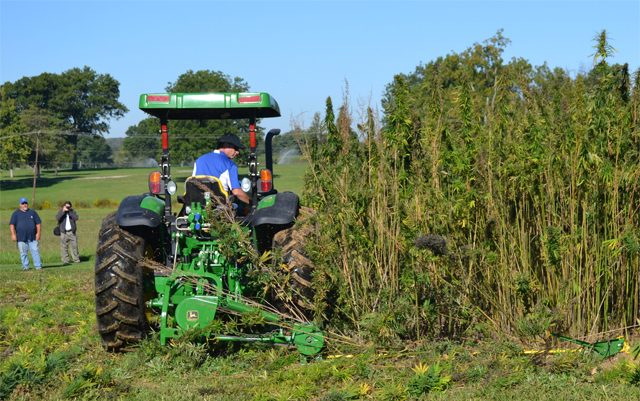New York’s Industrial Hemp Agricultural Research Pilot Program currently boasts 108 processors and 480 growers with over 20,000 acres for production. While the state has seen its fair share of growth, uncertainty looms over the entire supply chain.
After the December 20, 2018 passage of the 2018 Farm Bill, much of the legislative attention turned to the official rules from several federal agencies. Since then, little has come in the form of definite rules around hemp. Despite the urging of lawmakers, the Food and Drug Administration (FDA) has not released any rules at this time.
Recently, one federal agency took steps to solidify its regulations. On October 29th, the U.S. Department of Agriculture (USDA) released its proposed rules for the plant and its derivatives. Dubbed the U.S. Domestic Hemp Production Program, the proposal aims to establish a regulatory framework for the industry. Once created, hemp producers will be able to qualify for federal programs, including insurance coverage.
The draft rules then moved to a 60-day public comment period, which is now underway. Once the period finishes, the USDA will determine its state and tribal plans. Over 500 comments were logged as of November 12th.
While federal lawmakers determine its regulations, New York cultivators and its companies are seeing booms and burdens in the nascent space. Such booms include the market growth of the state. That said, many – including New York Senator Charles Schumer – believe that New York can only grow so much without the guidance of federal regulations from agencies like the FDA.
Uncertain federal regulations are just one concern looming over New York hemp cultivators as their first significant harvests came to fruition in November. A range of cultivation production headaches joined processing capacity and labor as critical concerns to farmers in the Hudson Valley. However, the most pressing concern appears to be the decline in prices. Stemming from an oversaturated market, the unbalanced supply and demand have dropped prices per pound from $40 last year to $15 as of late.
That said, farmers may receive a reprieve from their financial burdens after state lawmakers made a November ruling allowing medical marijuana companies to use farmers’ hemp for the production of their products. The decision would allow the state’s 10 licensed producers to source less expensive hemp from in-state farmers rather than be forced to cultivate their own.
The news may serve as the latest boom for the state’s hemp market. Still, issues with the law continue to present a problem for cultivators and cannabis companies alike. On November 6th, New York City police proudly posted on its social media that it seized 106 pounds of cannabis coming from a Vermont farm. The problem is, they seized cannabis sativa L. The hemp bust marked the latest example of the uncertainty surrounding law enforcement of hemp and marijuana in the space.
CBD Business Owners Find Joy in Customers, Not Regulation
Business owners lamented a lack of legal clarity as well. Jennifer Babaian is the founder and CEO of the hemp-wellness brand 7 Leaf Clover. Babaian said she was excited to see the market develop, but highlighted the state department’s inability to delineate concise rules.
She believes that a negative connotation of the market needs debunking as well. “There seems to be an underpinning that businesses are somehow trying to get away with something,” said the CEO. Babaian attempted to clarify, saying, “Until now, we have been self-regulating, holding ourselves to strict quality standards with nothing but ethical operations as an impetus.”
Lou Sagar is CEO of Manhattan’s The Alchemist’s Kitchen, a hemp retail store and education center. Sagar added that companies continue to face issues that very few other legal entities face. “The major challenge for selling CBD has been the restrictive access to merchant service processing online as banks remain highly conservative.” Sagar said banks will remain conservative until federal laws are further defined.
The work does have its highlights, according to both ventures. Each boasts physical locations that are thrilled to work with the public. For The Alchemist’s Kitchen, it includes serving as a learning destination where people can attend classes and seminars. 7 Leaf Clover’s Babaian noted the work they’ve done with the FDNY, NYPD and first responders to help those suffering from PTSD and addiction.
Going forward, Babaian expects to see larger cannabis companies turning to hemp as a revenue stream. She hopes that the new regulations, when passed, won’t make entry difficult for those looking to join the industry. Meanwhile, the CEO and founder hopes to see more accurate and in-depth reporting covering the space. She recalled the effects of the news coverage of the vape crisis. Babaian noted many publications were failing to disclose that the source of the products appeared to come from illicit market products.
The CEO discussed the effects of the news coverage. “Here in New York, the fall out manifested in the destruction of the retail portion of an entire industry, which is largely owned by immigrants who from one month to the next lost their livelihood through no fault of their own.”
New York’s Legal Future Appears Promising, Yet Hazy
Legal experts remained uncertain over New York’s hemp future. Jesse Harris, an attorney at Fox Rothschild, said the state was behind more proactive states like Pennsylvania, who implemented a state program immediately after the passage of the 2018 Farm Bill. On the other hand, New York remains stuck developing its program while it operates under the 2014 Farm Bill rules, severely limiting farming opportunities.
While Pennsylvania’s plan is under USDA review, the Empire State’s future is uncertain. “New York still needs to develop its own state plan before it can seek USDA approval, assuming the state wants to regulate commercial hemp.” Harris elaborated,”If not, cultivators will likely have to rely on the federal plan.”
Jessica Wasserman, an attorney for Greenspoon Marder’s cannabis practice, noted that if the state were to submit its own plan to the USDA, it would undergo a 60-day period where it can ask New York for amendments before deciding. During this window, state cultivators cannot obtain licenses, further hurting the market.
As such, Wasserman believes in one choice. “New York is not a state that is ahead of the game on getting a licensing system in place and would be advisable to follow the USDA federal option.”
Both attorneys believe that the market will continue to remain strong – despite any pain points – and prosper. Wasserman suggested that the U.S. could eventually become a leading global exporter of hemp and CBD in time. The attorney also mentioned the potential of hemp demand increasing in sectors from clothing to building materials.
Harris, on the other hand, sees a well-defined, segmented market covering the plant and its derivatives. He pointed towards Colorado, where the state Department of Agriculture oversees the plant, while the Department of Public Health & Environment oversees derivatives. He explained the rationale. “This is because, despite the similarities in source, the products are very different. The hemp plant is an agricultural commodity, just like corn, while hemp derivatives are more of a dietary supplement.”






